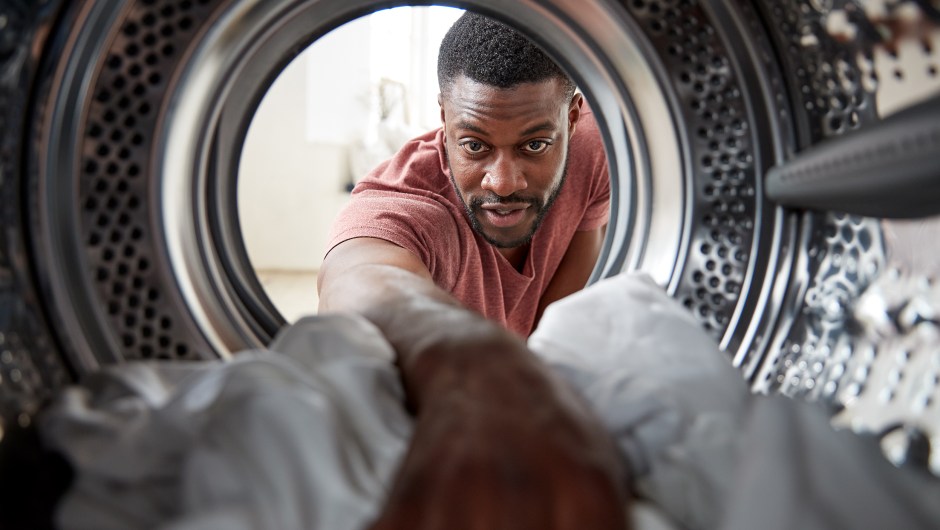The detergent aisle at the market can be an overwhelming place - there are many different to choose from and stain removal products for virtually every mess you can imagine, and then there are additional products that remove odors or add scents or that promise to leave your clothes soft and smooth. static free.
And now, as disinfection and sterilization have become increasingly important to consumers due to the Covid-19 pandemic, a new type of laundry product is taking up more and more space on those shelves: clothing disinfectants. .
But what are clothing disinfectants or clothing disinfectants?
How do they work and when should you use them?
And are they necessary?
We spoke to experts to learn more about these products and whether they should have a place in your laundry.
What are clothing disinfectants?
Laundry disinfectants, such as Lysol Laundry Sanitizer and Clorox Laundry Sanitizer, are products that are designed to kill certain bacteria on fabrics when used in washing machines.
One note: All of these items below are often out of stock, but are regularly restocked by retailers, so be sure to keep an eye out.
Lysol Clothes Sanitizer ($ 20.99, originally $ 23.01; amazon.com)
Clorox Clothing Sanitizer ($ 7.99; target.com)
In addition, there are spray and aerosol fabric sanitizers that are designed to clean fabrics without relying on the washing machine.
Tidal Antibacterial Fabric Spray ($ 16.25, originally $ 18.30; amazon.com)
Clorox Non-Whitening Fabric Sanitizer and Stain Remover ($ 3.86; walmart.com)
Clorox Fabric Sanitizer Aerosol Spray ($ 4.97; walmart.com)
Mary Begovic Johnson, director of scientific communications for Procter & Gamble, says: “Sanitizing products contain chemicals that kill germs and are regulated by the United States Environmental Protection Agency (EPA).
In general, cleaners reduce the number of certain bacteria (by 99.9%) to a safe level, while disinfectants kill bacteria and viruses.
However, the list of bacteria and viruses in which these products are effective is limited;
Consumers should carefully read the manufacturer's labels to understand what these products work on and what they don't.
Generally, clothing disinfectants are effective against the following:
Klebsiella pneumoniae, which can cause pneumonia, meningitis, and related problems
Staphylococcus aureus, which can cause staph infections
Salmonella enterica and Escherichia coli, foodborne pathogens that can cause gastroenteritis and systemic infections
Proteus mirabilis, which can cause urinary tract infections (UTIs)
Do you need to "disinfect" your clothes?
The short answer is no.
Patric Richardson, a laundry expert who runs The Laundry Evangelist website, says, "The reality is that your clothes are sterile only with regular washing."
Johnson echoes that, saying: 'The basic laundry cleaning process of using detergents combined with washing hands after handling dirty clothes and transferring wet clothes from the washer to the dryer provides proper hygiene for laundering. daily, even in cold water environments.
However, there are certain times when it may be necessary to disinfect clothing.
Johnson says that clothing disinfectants "are recommended for use in special circumstances: households with confirmed or suspected infections (stomach illness, vomiting, diarrhea);
people with weakened immune systems;
and work clothes potentially contaminated with pathogens of human, animal or agricultural origin ”.
If your laundry needs call for a sanitizing product, Johnson recommends that they be used in combination with a more thorough cleaning detergent such as Tide's heavy-duty formulas.
He also adds that these products "are not necessary for daily cleaning."
Tide Hygienic Clean Heavy-Duty Liquid Laundry Detergent ($ 18.97; homedepot.com)
Tide Heavy Duty Detergent Capsules ($ 12.97; homedepot.com)
Disinfectants and Covid-19
According to these laundry, cleaning and disinfection experts, no disinfectants are needed to protect against viruses that cause colds, flu, and Covid-19.
"The regular laundry process combined with special handling instructions and the use of a high-quality detergent is enough to help protect healthy, active homes against germs that cause diseases like Covid-19, flu and colds." says Johnson.
Johnson recommends using the following special handling precautions when doing laundry for someone who has been ill:
Wear disposable gloves when handling dirty clothing, such as clothing and bedding worn by a person who is ill or contaminated with work clothes
Please wash those items separately from other people's items
Don't shake out dirty clothes
Take off your gloves and wash or sanitize your hands immediately after handling contaminated clothing, and wash or sanitize your hands again after transferring wet clothing from the washing machine to the dryer
Cleans and disinfects laundry baskets, appliances, and other surfaces that have come in contact with dirty clothes
While these products offer no benefits when it comes to the novel coronavirus, consumers are understandably still wanting to use clothing disinfectants as the pandemic continues to put lives at risk.
Richardson offers peace of mind to people seeking products like clothing disinfectants out of concern that they are not doing enough to protect themselves and their loved ones against the coronavirus.
"I think we want to do something extra as a means of being safe, but what we are already doing is safe," he says.
I don't think you need a new product to do that.
I think you already have the tools in your toolbox.
Note: The above prices reflect the price at the time of publication of the article.

